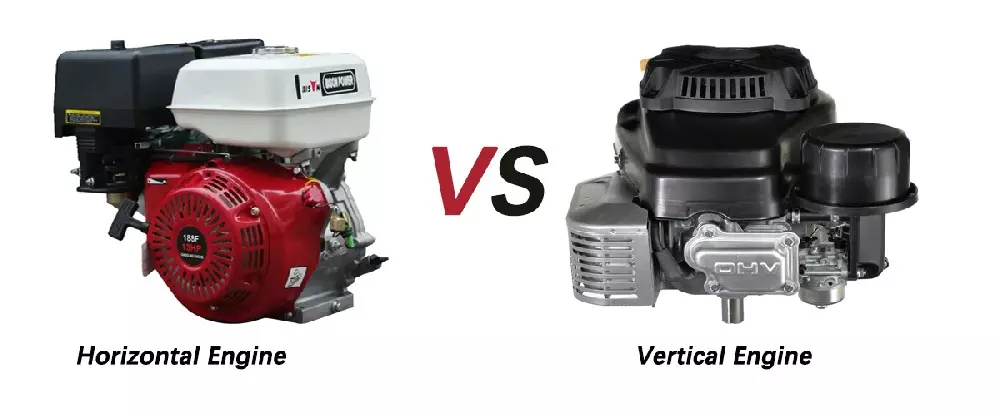19Apr 2023
table of contents
In this blog post, we will compare the advantages and disadvantages of horizontal engines and vertical engines from many aspects, and understand their main differences to help our importers better choose the right engine.

A horizontal engine is an internal combustion engine with cylinders arranged in a row, where the cylinders are arranged horizontally, parallel to the ground. A horizontal engine can be either two-stroke or four-stroke, depending on the type of piston used. In this configuration, all the pistons in the engine are connected to a common crankshaft, which enables it to deliver high torque and horsepower and is often used to power industrial equipment such as air compressors, pumps and generators.
A vertical small engine is an internal combustion engine with cylinders arranged vertically. In this configuration, pistons move up and down inside vertically arranged cylinders, which are converted from linear to rotary motion by a crankshaft. Their compact design and low weight make them most commonly used in lawn mowers, garden tractors and other outdoor power equipment.
BISON small engine manufacturer offers a range of horizontal and vertical engine style options.
Most horizontal shaft engines wholesale in the market have larger displacement and produce higher power output compared to vertical engines.
Another benefit of horizontal engines is their maintainability. The cylinders are arranged in a single row, making maintenance tasks such as inspection, cleaning, and replacing internal components easier to perform than with upright engines.
Additionally, horizontal engines tend to generate less vibration than vertical engines because the forces created by the piston motion are balanced along the length of the crankshaft. As a result, machinery such as BISON generators driven by horizontal engines run more smoothly with less wear on components.
Vertical engines also offer several advantages over horizontal engines, making them a popular choice for many applications. Some key advantages are:
Vertical small engines have a vertical design and are more compact than horizontal engines. This makes them easier to integrate into applications where space is limited, such as small garden machines and chainsaws.
Due to their compact design, vertical engines are also generally lighter than horizontal engines. This makes them easier to transport, install and handle.
Vertical shaft engines are also quieter than horizontal engines. This makes vertical small motors ideal for use in environments where noise pollution is a concern, such as residential areas or machinery for indoor applications.
Welcome to click to browse the BISON engine products with many advantages mentioned above.
| Horizontal Engine | Vertical Engine |
| higher power output | more compact structure |
| more maintainability | be lighter |
| less vibration | be quieter |
Horizontal engines have some disadvantages. The first is the large size. Since horizontal engines are designed to be wider and longer this also means horizontal engines also tend to be noisier .
The vertical engine design, while lightweight and compact in design, has some disadvantages. Vertical engines are expensive to maintain. The engine has limited access points, so you won't be able to access all the parts without taking most of the machine apart. This means that if something happens to your device, you have to take it apart completely to fix it.
Another problem with vertical engines is their limited power output: because they're designed for smaller machines like brush cutters or snowblowers, not larger tools like tractors or excavators (which require more torque), They cannot generate enough power to handle heavier machine payloads, and flat-panel engines are better suited for these heavy duty tasks.
| Horizontal Engine | Vertical Engine |
| large size to store | more expensive |
| be noisier | limited power output |
When choosing between horizontal and vertical engines, it is important to consider the above pros and cons and evaluate which engine type is best for the specific application you need.
BISON is a manufacturer that imports and sells small engines to all over the world. It can provide customers with horizontal and vertical engines at competitive prices. Welcome to inquire!
inquiry form here
BISON BLOG, All the latest news and views from Bison Machinery.